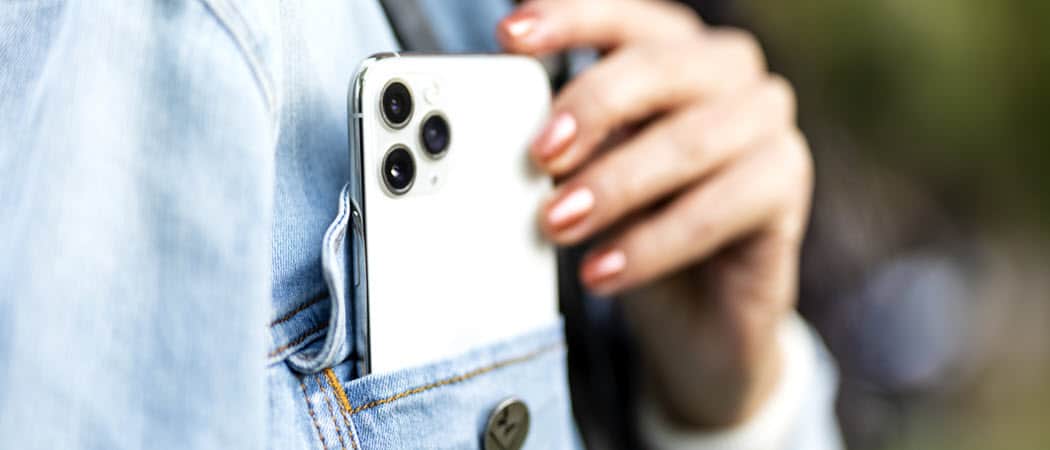iPhone 12 Pro Max: Exclusive Features

All four iPhone 12 handsets, including the least expensive iPhone 12 mini, includes many of the same internals. But the Max has some exclusive features.
In 2019, Apple released its first professional iPhone lineup, which consisted of the iPhone 11 Pro and iPhone 11 Pro Max. The only difference between the two models was the screen sizes. This year, Apple took a different path with the iPhone 12 Pro and iPhone 12 Pro Max. Besides the display’s size, the 6.7-inch iPhone 12 Pro Max offers extras not found on the 6.1-inch iPhone 12 Pro. Here’s a look at the similarities and differences between the new smartphones.
iPhone 12 Series
All four iPhone 12 handsets, including the least expensive iPhone 12 mini, includes many of the same internals. Specifically, each offers the all-new A14 Bionic chip with a next‑generation Neural Engine and a Super Retina XDR display. You’ll also find an HDR display, Face ID, water-resistance up to a maximum depth of six meters up to 30 minutes, 5G compatibility, True Tone, Wide Color (P3), Haptic Touch, and more. Although all four models include an OLED display and ceramic Shield front, the Pro models use a matte glass back. The regular models have a glossy glass back by comparison. The Pro models also include 6GB RAM versus 4GB RAM on the iPhone 12 and iPhone 12 mini. However, this shouldn’t make a difference for everyday tasks since Apple optimizes RAM use according to the model.


iPhone 12 Versus iPhone 12 pro
Not surprisingly, the feature set increases significantly once you jump to the iPhone 12 Pro and iPhone 12 Pro Max. These models shift to surgical-grade stainless steel outside versus the aerospace-grade aluminum found on the regular iPhone 12 models. There’s also a telephoto camera lens on the professional versions that join the ultra-wide and wide lens found on all four models. Apple calls the threesome a “Pro 12MP camera system.”
The front camera is the same in all four models. Each is also fast-charge capable, which means you can charge the devices up to 50% in 30 minutes with a 20W adapter or higher. Each model supports MagSafe accessories and wireless chargers.
From a color perspective, the iPhone 12/12 mini is available in Blue, Green, (PRODUCT)RED, White, and Black, while the iPhone 12 Pro/Pro Max comes in Pacific Blue, Graphite, Gold, and Silver.
Apple has made some interesting decisions when it comes to storage on the regular and Pro models. The former models are available with 64GB, 128GB, and 256GB. The Pro models start at 128GB and also include 256GB and 512GB.
Other Key Differences Between the iPhone 12 and iPhone 12 Pro models
Missing out on a telephoto lens isn’t a big deal for many folks since most primarily use the wide lens in day-to-day photography. When added with the LiDAR Scanner, exclusive to the professional series, more camera differences come into focus. First launched on the 2020 iPad Pro, LiDAR brings Night mode portraits, faster autofocus in low light, and alternative reality (AR) experiences to the professional iPhones.
Moving to video, the Pro models include HDR video recording with Dolby Vision up to 60 fps, compared to HDR video recording with Dolby Vision up to 30 on the iPhone 12. Video camera zoom slightly differs across the models as follows:
- The iPhone 12 mini and iPhone 12: 2x optical zoom out, digital zoom up to 3x
- iPhone 12 Pro: 2x optical zoom in, 2x optical zoom out, digital zoom up to 6x
- And the iPhone 12 Pro Max: 2.5x optical zoom in, 2x optical zoom out, digital zoom up to 7x
Amazon.com Price updated on 2024-08-15 - We may earn a commission for purchases using our links: more info
iPhone 12 Pro Versus iPhone 12 Pro Max
As noted, Apple didn’t keep everything on the iPhone 12 Pro and iPhone 12 Pro Max models. The key differences mostly exist on the camera systems. However, let’s start with the display.


Screen Size
At 6.1-inches, the iPhone 12 Pro display is 0.3-inches larger than the iPhone 11 Pro. The iPhone 12 Pro display offers a 2532-by-1170-pixel resolution at 460 ppi, 2,000,000:1 contrast ratio, 800 nits max brightness, and 1200 nits max brightness (HDR).
By contrast, the iPhone 12 Pro Max includes a 6.7-inch (diagonal) all-screen OLED display versus a similar 6.5-inch display found on last year’s iPhone 11 Pro Max. The iPhone 12 Pro Max features a 2778-by-1284-pixel resolution at 458 ppi, 2,000,000:1 contrast ratio, 800 nits max brightness, and 1200 nits max brightness (HDR).
Thanks to the ceramic shield front on the iPhone 12 Pro and iPhone 12 Pro Max, there is four times the drop performance of previous iPhone models.
Battery Life
The iPhone 12 Pro Max’s larger display requires a bigger battery and offers better battery life.
The iPhone 12 Pro includes a 2,815mAh battery, just like the iPhone 12. For this, you can expect video playback of 17 hours or 11 hours with streaming and audio playback of 65 hours. The larger iPhone comes with a 3,687mAh battery. With this, you’ll experience up to 20 hours of video playback, 12 hours for streaming video, and audio playback up to 80 hours.
Camera
As first noted above, the rear-facing camera system found on both Pro models includes an ultra-wide, wide, and telephoto camera.
The ultra-wide camera is identical on both models and provides significant software improvements over the iPhone 11 Pro series. There’s also the new Night Mode that’s also available on the wide camera. Working with the LiDAR Scanner, the Night Mode is designed to capture low-light shots.
The telephoto camera is where you’ll begin seeing differences. Though they contain the same sensor, the iPhone 12 Pro Max telephoto camera provides a 2.5x optical zoom factor compared to the 2x optical zoom found on the smaller model. The optical zoom range also differs from 5x on the Max and 4x on the Pro.
The wide-angle lens is where you’ll find the biggest differences between the Pro models. Specifically, the iPhone 12 Pro Max offers an improved f1.6 aperture camera, thereby allowing more light in, a larger sensor for pixels, which makes for higher-quality images, and a sensor-shift optical image system. The last of these stabilize the sensor, not the actual lens, which leads to more speed and precision.
Which Pro is For You?
For most, deciding whether to purchase an iPhone 12 Pro or an iPhone 12 Pro Max will come down to screen size. If you want the largest iPhone ever produced, spend the extra money and get the iPhone 12 Pro Max. Otherwise, ask yourself whether the battery and camera improvements are enough to justify the extra price. Of the two, battery life is probably more important. The difference is significant, especially if you plan on using your phone throughout the day and would prefer not to charge it until nighttime.
The Bottom Line
In summary, go with the iPhone 12 Pro Max if you want the best of the best, need maximum battery life, or you’re a photographer looking to push your mobile craft to fun new levels. Go with the iPhone 12 Pro if you want a smaller handset, don’t care about the camera perks, and want to save some money.

![Apple iPhone 12 Mini (64GB, (Product) RED) [Locked] +...](https://m.media-amazon.com/images/I/41b3q1vIFML._SL160_.jpg)
![Apple iPhone 12 (64GB, Blue) [Locked] + Carrier Subscription](https://m.media-amazon.com/images/I/41xssMLI2DL._SL160_.jpg)
![Apple iPhone 12 Pro (128GB, Graphite) [Locked] + Carrier...](https://m.media-amazon.com/images/I/31Y9fuy8yaL._SL160_.jpg)
![Apple iPhone 12 Pro Max (128GB, Graphite) [Locked] + Carrier...](https://m.media-amazon.com/images/I/31-dxqfEAfL._SL160_.jpg)





